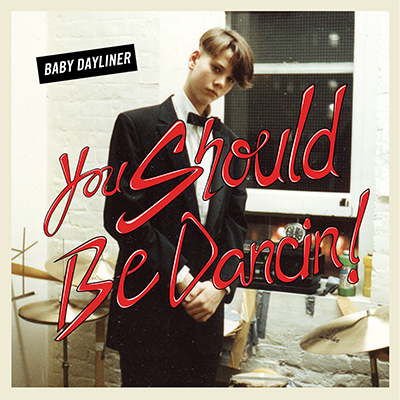
Released on April 26, 2019
HWY-056
Digital
Purchase Album
Songs
- Stress X Life (feat. Eric Tonken & Marian Lorraine)
- You Should Be Dancin'
- Talk To Me
Notes
About: Baby Dayliner’s ‘You Should Be Dancin’’
by Nico Muhly
Let’s talk for a second about Baby Dayliner’s sound, and first off, his voice: There is something inherently strange about it; untrained, quirky, and insistent in this one trick in which a single note simultaneously exists in two different tunings. It is a wonderful combination of stylized and conversational, and the lyrics stem from this duality. I want to say that the voice is old-fashioned, but then I want to take that back, because I’m not sure what voice from the past it might resemble. It is it’s Own Thing and surprisingly emotional, especially given the austere and old-fashioned backing tracks.
Musically all the songs are usually set against simple simple simple basslines and high strings — way fewer notes than we’re used to hearing. As a result, the vocal lines feel almost incorrect in context — we need one more chord or one more backup vocal. The instrumental landscape is synthesized, so it’s a bit 80’s, and the danger is that we might be in an Ironic Space, my least favorite, but then his voice is so naturally expressive that it reassures us that these words are deeply felt, even if seen through a variety of stylized lenses.
When it comes together you get a kind of magic, such as “Key Largo,” which is both a fully ridiculous and stunningly satisfying song. Lyrically; it’s essentially the Floridian response to the Monty Python Finland song (“A place where I quite want to be.”) He sings in a speaking-voice register about wealth and sunburns, but then suddenly jumps up an octave to apostrophise: "Key Largo!" The effect of releasing his expressive vibrato is fantastically expressive against the 80’s sparseness of the synthesised strings.
Or in “You Push I Go,” we have an obsessive set of repeated text: most of the lyrics are narrative, in a sort of Suzanne Vega covering The Streets way. More specifically, the lyrics alternate between the repetitive and banal (“Gonna get a vodka soda”) to these iconic little zen statements “You push; I’ll go” that access a more primal sense of love and loss and all the other things we’re meant to feel when listening to music. It takes us out of the conversational tone into that magical place that only repeated text can give us — it scratches me in the Laurie Anderson place when “you push; I’ll go” turns, after a few cycles, into just “I’ll go, I’ll go, I’ll go.” I haven’t seen this songs live yet, but I can see in my mind’s eye the dance moves in the stuttering drum fills — a hallmark of his music I have never heard anywhere else.
At the other extreme musically is “You Should Be Dancin” — one of the more complicated Baby Dayliner songs I’ve heard in terms of instrumental information as well as lyrical content. We have a little palindromic guitar riff, a sort of distressed white-noise early Wendy Carlos synth in the background, synthesised claves. The song is relentlessly minor in mood — he avoids anything too sunny here, and the effect is a frowning joy, the fun of Bowie in “Let’s Dance" tempered by an exhortation to engage in a solo activity: we should be dancing, and he’s going to sit and watch us do it.
Which is to say let’s talk for a second about what I’ve been building to with this whole analysis: Baby Dayliner’s dancing.
The first time I saw him live, I was shocked by what a confident and terrible dancer he was. Alone on the stage, with a little machine doing playback, he danced the same way I dance when I’m mopping the floors and listening to Janet Jackson. Every three or four beat pause in the vocal was an excuse for an awkward gyration, as if there wasn’t a room of people watching him. I was there with friends and I think the idea was that we’d come to hear somebody else, but the only thing that sticks with me from that night all these years later is Baby Dayliner’s commitment to dancing that way for thirty minutes.
And, finally, that’s what makes Baby Dayliner so special: unlike most of the music made in the history of the world, his work sticks with you.
What do I think the point of this music is? It’s a thing I mentioned earlier: we should be dancing, and he’s going to sit and watch us do it.
Nico Muhly is a composer of operas, chamber and symphonic works, and sacred music whose influences range from American minimalism to the Anglican choral tradition. He is the youngest composer ever commissioned by the Metropolitan Opera and collaborates frequently with artists including dancer Benjamin Millepied, harpist & songwriter Joanna Newsom, and indie icons Sufjan Stevens & Bryce Dessner.